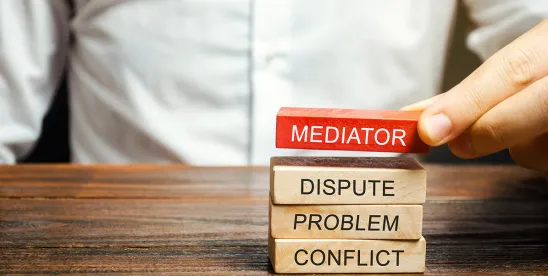Litigation is costly, both in time and money. Making this worse, court dockets often are backlogged, so it can take even longer—sometimes years—to resolve a lawsuit.
To save litigants and courts time and resources, most courts now require litigants in civil cases to mediate or engage in some other type of dispute resolution process long before a case is actually called for trial. Since being implemented about thirty years ago, this has proven to be a very positive development. Through mediation, more disputes are resolved earlier in the litigation process at substantially less cost to the litigants and burden on the courts.
Even though mediation has become customary and generally is required in the civil litigation world, it still seems to surprise litigants that they will be required to discuss a possible settlement with the opposing litigant. To comply with the court's rules and avoid being sanctioned for failing to do so, it is important for litigants to prepare for participating in mediation. Litigants should work with their attorneys to educate them on their obligations to participate in mediation, the benefits of doing so, and their (realistic) options for resolving the dispute.
Here we hope to provide some observations for effective mediation. First, we give an overview of the basic rules and requirements for mediation in North Carolina's state and federal courts. Then we offer tips for bringing a dispute to a successful end through mediation.
Road Map: Basic Requirements and Logistics
The rules and requirements for mediation are similar across North Carolina's state courts and the three federal districts located in North Carolina. However, because there is some variation, it is well-advised for litigants to talk early and often with their attorneys about the mediation process, the requirements of the applicable rules, and the obligations imposed by these rules on them.
To that end, here is a summary of some of the requirements and obligations that are imposed by the rules of many courts:
Nearly all civil cases filed in federal court and in North Carolina Superior Court will be required to participate in a mediated settlement conference. In North Carolina District Court, generally only certain family law cases—ones involving equitable distribution, alimony, post-separation support, or claims related to separation agreements—will be ordered to participate in mediation. A handful of matters filed before the Clerk of Superior Court, such as estate, guardianship, and boundary and partition cases, may be ordered to mediation. In all other matters where mediation is not ordered by the court or the clerk, litigants generally may still agree to attend a formal mediation process.
Mediation generally is held after the litigants have had a reasonable time to conduct discovery—that is, the opportunity to request and exchange information, documents, and other evidence—but well in advance of trial. Most often, mediation should be scheduled at a time when it is expected that each litigant will have obtained sufficient information to properly assess their position in the case. In some types of cases, North Carolina law requires that the litigants to engage in mediation before a lawsuit is filed. Those types of cases include farm nuisance disputes, some insurance claims, public records disputes, and condominium and homeowners' association disputes. In these cases, the litigants will likely be required to mediate again once litigation is underway. Actually, there are some situations where the litigants either have or can provide and exchange the information needed to assess their position and engage in informed and meaningful negotiation and engage in mediation before a lawsuit is filed, even though this is not required, thereby avoiding the cost, delay, and disruption that accompanies litigation.
Depending on the court, the mediation conference may be held virtually, but usually, the location is decided by the agreement of the litigants and the mediator. Mediation (typically) is not held at a courthouse. Rather, the litigants usually elect to meet at a neutral location, or one side will offer to host at his attorneys' office. Importantly, the litigants and their attorneys must be present at the mediation conference, unless the participants agree otherwise. Skipping out on court-ordered mediation can result in sanctions, such as contempt proceedings or an order to pay fines or the other side's attorneys' fees and costs. Litigants should discuss the location of the mediation with their attorneys. Deciding on the location involves tactical and practical considerations that sometimes are important.
Tips for the Journey: Preparation and Strategy
After becoming familiar with the requirements of mediation, the next step is to consider how best to prepare for mediation, including identifying available strategy choices before and during the mediation conference itself.
Before Mediation
Litigants should discuss mediation with their attorneys early and often throughout the litigation process. Remember: it's a process. At the outset of a lawsuit, emotions often run high, and the idea of settling the dispute may not always be a welcome one. But because litigation is time-consuming, expensive, disruptive, and emotionally draining, it generally is well advised to consider how the anticipated costs of litigation stack up against the costs of reaching a middle ground. To that end, mental preparation is key. It is important for a litigant to think through with their attorneys the pros and cons of mediation and settlement in anticipation of each stage of the case and in preparation for mediation, particularly as circumstances shift and change during discovery. The likelihood of a successful mediation increases when litigants are mentally prepared to participate and negotiate in good faith.
Beyond mentally preparing for the actual settlement negotiations, litigants and their attorneys should consider several other seemingly mundane, but vital, components of setting up a mediated settlement conference.
-
Select a mediator. Consider potential mediators' knowledge base and experience—does the case involve a complex area of law or nuanced factual issues that would benefit from someone with specialized experience? Also, consider the potential mediators' personal characteristics (for example, proactive or passive, creative or more structured, and flexible or rigid) and the relationships the mediator may have with other attorneys or litigants involved. And consider the relationships of the mediator with the attorneys involved and, importantly, the attorneys' assessment and recommendations about the mediator. The prospect of success will be enhanced if the mediator is respected, trusted, and able to control the discussion and guide—or even challenge—the litigants and attorneys when necessary.
-
Choose a location. In light of the nature of the case and participants' personalities, mediation may have a higher likelihood of success if it's in person. Or, depending on litigants' needs, a virtual or remote mediation may pose important benefits. If mediation will be in person, think about whether one side can host, or if it is better—again, considering the nature of the case, the participants' personalities, as well as costs—to find a neutral location. The place for mediation sometimes is affected by litigants' pre-conceived notions of fairness, which, though important, should be tempered by objective reflection. Selecting the place may also be affected by other tactical considerations – such as a desire to send a subtle conciliatory message by being cooperative, or the need for plausible unavailability of information – that a litigant should discuss with their attorneys.
-
Consider the timing. Should mediation occur early in the case or even before a lawsuit is filed, or is it more likely to be successful later in the case, after the litigants have completed most or all of discovery? Answering this question largely depends on whether there are important factual issues that need to be resolved before a meaningful discussion can be had. It also will depend in part on the amount of controversy, or more precisely, a comparison of discovery costs and a client's "best day" recovery. And it may depend on the litigants' emotions. Over time, feelings often mellow, and the litigants may become more amenable to bending their positions toward a middle ground. To enhance the chance of success in mediation, every litigant must have sufficient information to properly assess their position.
-
Declining to mediate is an option. Although rare, there are cases where a litigant's best option may be to decline mediation or to truncate the process. For example, a litigant may feel so strongly about his legal position that the litigant may be better able to secure the objective it is seeking by declining to mediate until after a court has ruled on a dispositive motion. When this occurs, the litigant may choose to schedule the mediation after a ruling on the motion that potentially might dispose of the case, and, if such a motion is granted, mediation may never occur. Alternatively, perhaps based on counterproductive prior unsuccessful negotiations, a litigant may feel that mediation would be unproductive and a waste of time and money. When this occurs, the rules adopted by most courts require litigants to seek and obtain permission from the court to forego mediation. And a litigant may have a sense that an opposing litigant is seeking to use mediation more for the purpose of gathering intelligence than seeking to resolve a dispute. When this occurs, a litigant may choose to truncate the process by ending the process before disclosing his position. Declining to mediate is an important tool to use when needed.
-
Prepare a confidential mediation statement. Prior to the mediation conference, litigants (working with their attorneys) should consider drafting a confidential mediation statement for the mediator, even when one is not required. A confidential mediation statement is a summary of relevant facts, case history, and legal theory, intended solely for the mediator. It will give a litigant the opportunity to "prime the pump" and equip the mediator with information about the litigant's position and desired outcome. The statement should be provided to the mediator sufficiently in advance to provide the mediator with an opportunity to review it, but not so far in advance that the mediator reviews it too early and might forget important information.
At the Mediation Conference
The mediator is not a judge. Litigants often want or expect the mediator to choose a side or make a decision during the mediation conference, but that's not a mediator's role. The mediator won't decide who's right and who's wrong. The mediator's aim is to act as a neutral go-between who draws the litigants toward a middle ground of their own choosing. The mediator generally limits his opinions and observations to what will bring the lawsuit to a settlement. Often this means challenging the attorneys and litigants to consider (perhaps reconsider) positions they have taken. The mediator does generally forecast what might occur at trial. That said, during the mediation conference itself, listen carefully and take good notes. An effective mediator will give clues throughout the process about the strengths and weaknesses of each side's case.
Relatedly, mediation is not like a hearing or trial. Often there is an opening session where the mediator will go over ground rules and expectations, and the litigants will have an opportunity to address each other. In this regard, it is not uncommon – when the litigants have a sound understanding of the pertinent facts or where the tension between litigants is emotionally fused – for the litigants and mediator to dispense with addressing each other. But for the bulk of the conference, the litigants are sequestered in separate breakout rooms with their counsel. The mediator speaks with each side privately, ferrying messages and settlement offers back and forth. Use the downtime between private conferences with the mediator to think creatively about options and strategies for the resolution of the dispute. Again, mediation is a process, so flexibility throughout the day is essential.
In addition to the confidential mediation statement provided beforehand, think about whether there is other confidential information that would be advantageous to share with the mediator. For example, are there certain personality factors that may play a role in the opposing litigant's willingness to settle the case? Or is there a sense that the opposing attorney has provided counsel to his client that is unsupported and has created unreasonable and unfounded expectations? There are times when informing a mediator of such circumstances through confidential communication will help to equip the mediator to better understand and seek to have a dispute resolved. Generally, when going over the ground rules, a mediator will make clear how the mediator will treat information for purposes of confidentiality. A litigant almost always will have the power to inform the mediator that certain information is confidential and, if so informed, the mediator will not disclose the information to another litigant.
Then, as offers and counteroffers are made, consider different ways in which negotiations might be given an extra push toward the finish line. For example, it might make sense to set a bracket within which a litigant is willing to negotiate. Or thinking of ways to sweeten the deal, called "chumming," could do the trick. In cases where a resolution involves more than an exchange of money for a release, creativity is often needed and vitally important. Or—and use this carefully—consider when making a last and final offer might be effective to close the deal.
Finally, mediation can be arduous and, at times, can seem like watching paint dry. The mediator generally has the power to decide when enough is enough. This usually occurs in one of three ways: success and settlement; failure and impasse; and not fully finished and adjourned with an expectation of continued negotiation. It is important not to lose sight of adjournment. To emphasize again: mediation is a process. In many cases, the path to resolution is better found by providing more time and opportunity to reflect, than by declaring failure and impasse.
At the end of the day, even if mediation does not result in a resolution, all is not lost. Consider what has been gained throughout the process and how it better positions the case for resolution either for a second mediation down the road or trial.





 />i
/>i

